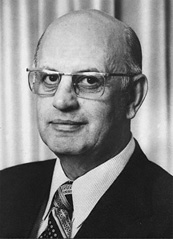Pieter Willem Botha
|
|
Pieter Willem Botha, (born January 12, 1916) commonly known as "P.W." and as "die groot krokodil" (the big crocodile) was Prime Minister of South Africa from 1978 to 1984 and State President of South Africa from 1984 to 1989.
Botha was a longtime supporter of South Africa's National Party and a staunch advocate of racial segregation and the apartheid system. He was elected to parliament in 1948 and became defense minister in 1966. When Prime Minister B.J. Vorster resigned in 1978, Botha became Prime Minister.
In 1983 South Africa's constitution was revised, creating an executive presidency. In 1984 Botha was elected to this post.
As president, he had an ambitious foreign policy, pursuing a secret nuclear weapons program and remaining steadfast in South Africa's occupation of the neighbouring territory of Namibia. His authoritarian style of leadership made him quite unpopular in many western countries, and many condemned him as a cruel, racist dictator. In the United States and the United Kingdom there was much debate over the idea of implementing trade sanctions in order to weaken Botha and the white-minority regime.
In some ways however, Botha's implementation of apartheid was actually more moderate than that of his predecessors. He legalized interracial marriage, which had been banned, and lifted the constitutional prohibition on multiracial political parties. He also relaxed the Group Areas Act, which barred non-whites from living in certain areas, and granted limited political rights to Coloureds (South Africans of mixed white and non-white ancestry) and Indians. He balked, however, at the idea of granting voting rights to Black South Africans. He was willing to compromise on what he saw as the nonpolitical aspects of apartheid, but on the central issue of granting political rights to Blacks and ending White supremacy, he would not budge.
Botha's uncompromising policies greatly polarized his own party, and eventually led the National Party to splinter into various feuding groups. In 1989 protests within his own cabinet and party forced him into resignation, and the moderate Frederik W. de Klerk became president. Five years later de Klerk would dismantle the apartheid system, holding free and fair elections. The African National Congress Party of Nelson Mandela, a black anti-apartheid activist who had previously been imprisoned under the Botha regime, won these elections. Mandela became South Africa's first black president.
Botha opposed many of de Klerk's reforms, and refused to testify at the Mandela government's Truth and Reconciliation Commission for exposing apartheid-era crimes.
Botha was not related to contemporary National Party politician Roelof Frederik "Pik" Botha, who served as foreign minister.
| Preceded by: Balthazar Johannes Vorster | Prime Minister of South Africa 1978–1984 | Succeeded by: position abolished |
| Preceded by: Marais Viljoen | State President of South Africa 1984–1989 | Succeeded by: Frederik Willem de Klerk Template:End boxde:Pieter Willem Botha fr:Pieter Willem Botha |

